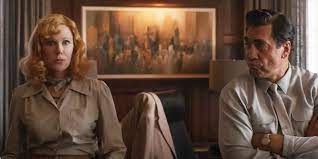Writer/director Aaron Sorkin tries to add a chapter to show business history with Being the Ricardos, a movie built around one apparently pivotal week in the life of the fabled sitcom, I Love Lucy.
For the most part, Being the Ricardos offers an insider's view of preparation for the 37th episode in a series that regularly attracted 60 million viewers to CBS every Monday night.
Casting Nicole Kidman as Lucille Ball and Javier Bardem as Desi Arnaz, Sorkin follows several themes through a story that detours to provide a capsule review of Ball's Hollywood career. She never made it to A-list ranks and instead became one of the entertainment's great physical comics.
So, about those themes: Ball is accused of being a Communist, the Ball-Arnaz marriage wobbles, and Arnaz fights the network over whether the show can continue with a pregnant Ball.
It may seem odd to younger audiences but during the 1950s, pregnancy couldn't be mentioned on TV, presumably because it might encourage thoughts about how this essential human condition came about.
As for politics, the '50s preoccupation with Communism has been dealt with before with cases much more powerful than Ball's. In 1936, she checked a box saying that she was a member of the Communist party, evidently as a way of appreciating the left-wing grandfather who raised her.
None of its story lines prove powerful enough to carry the movie. Sorkin hasn't really made clear what he's trying to say -- other than to expose the gap between back-stage and on-camera realities and to tell us that making comedy is a serious business.
Kidman doesn't seem like an ideal choice for playing Lucille Ball. When she's playing Ball, Kidman seems like ... well ... Kidman — with red hair, of course.
As Lucy, though, she perfectly captures the expressions, movements, and voice that made Ball a great comedian. It’s one hell of a feat.
Sorkin may have meant for us to fret about potential consequences of Ball's being tainted as a Red, to use the language of the day, by Radio broadcaster Walter Winchell.
Would the papers get hold of the story and run with it? If they did, could the show survive?
I won't get into specifics about the way Sorkin resolves the question. All I'll say is that relief comes from an unexpected source and is presented as a triumph. Yippie. Lucy's off the hook.
How about lamenting the red-bating hysteria that put her "on the hook" in the first place?
Bardem makes a convicting Arnaz, a womanizing bandleader who found his way to stardom when Ball insisted he be part of her transition from radio to television. Arnaz proved a strong comic partner for Ball with a shrewd appreciation of how to use the show's success to pressure network executives into doing what he wanted.
The secondary casting is quite good. J.K. Simmons and Nina Arianda play William Frawley and Vivian Vance, the actors who portrayed the Ricardos' neighbors, Fred and Ethel Mertz.
Simmons captures Frawley's fondness for alcohol and wit and Vance makes a perfect second-fiddle to Ball, a woman who's not without her resentments about having to be subordinate to Lucy.
As for the marriage: Arnaz's philandering hardly seems shocking.
Tony Hale as Josh Oppenheimer, the show's executive producer, and Alia Shawkat, as the only woman writer on the show's staff, both have nice turns.
To add authenticity and to take care of expository chores, Sorkin includes interviews with some of the show's writers and producers (all played by actors) as seen in their older, reflective years. The wise elders clue us about the reality of bygone days.
It occurred to me that a truly revealing and far more intriguing movie could have been made about Frawley and Vance. In it, we might have seen Arnaz and Ball through the lens of those indispensable and often neglected performers: “supporting” actors.
But what do I know?
Being the Ricardos never convinced me that Sorkin's movie was more than a sporadically entertaining look at what amounts to ancient TV history. Without either the comforts of nostalgia or the urgency of highly focused drama, I was left taking note of how often I could forget it was Kidman playing Lucille Ball and Bardem smacking the congas as Desi Arnaz.

No comments:
Post a Comment